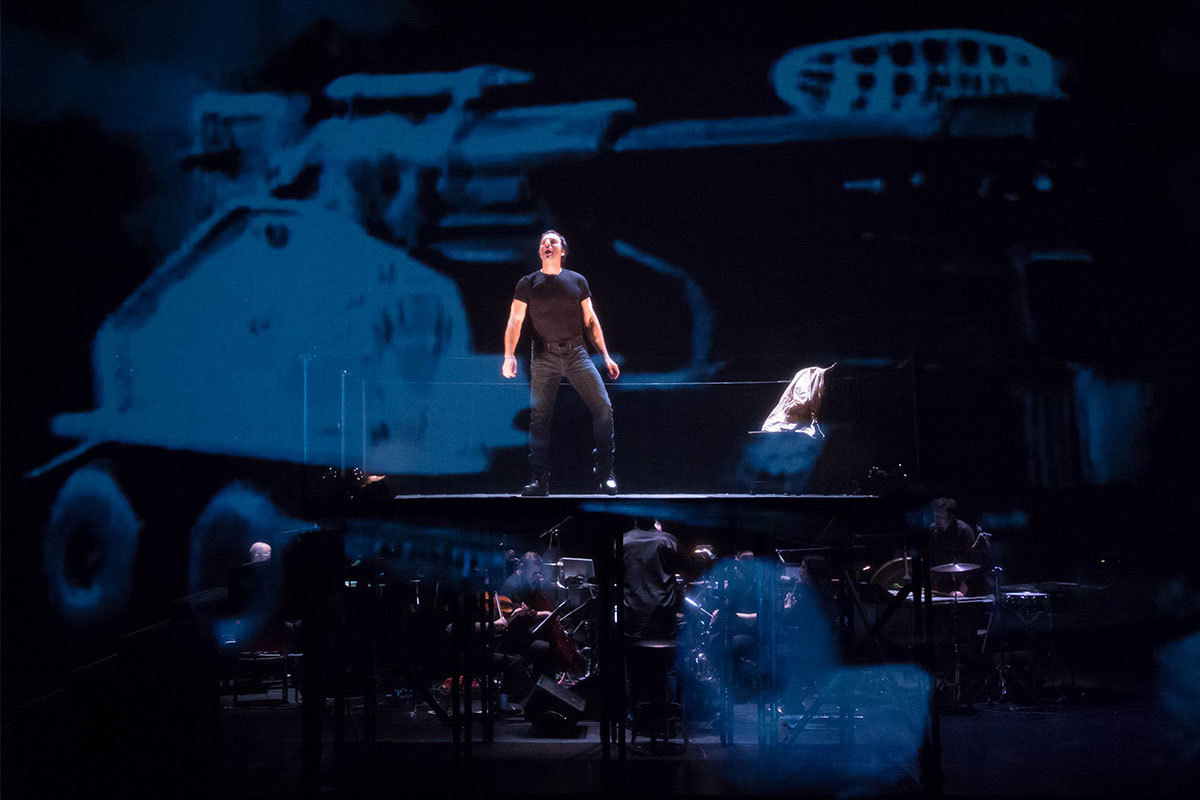Review: SOLDIER SONGS at Ford Amphitheatre
 On Saturday evening October 13, 2018, Los Angeles Opera presented David T. Little's 2006 opera, SOLDIER SONGS, at the Ford Amphitheatre. Little based his libretto on interviews he conducted with family members and schoolmates who served in World War II, Vietnam, the Gulf Wars, and Afghanistan. His definitive music included explosions and the roar of heavy artillery in describing the reality of war.
On Saturday evening October 13, 2018, Los Angeles Opera presented David T. Little's 2006 opera, SOLDIER SONGS, at the Ford Amphitheatre. Little based his libretto on interviews he conducted with family members and schoolmates who served in World War II, Vietnam, the Gulf Wars, and Afghanistan. His definitive music included explosions and the roar of heavy artillery in describing the reality of war.
Before the opera began, Producer Beth Morrison and the creative team discussed the opera's raison d'être and answered audience questions. Director Ashley Tata noted that although a child, a young man and an old man are all part of the drama, each is part of the same person at a particular time in his life.
The story bridges the dichotomy between the civilian perception of war and the conditions experienced by soldiers. It shows the reason why veterans often choose not to tell their war stories to anyone who has never been to war. As The Soldier says repeatedly: "I never talk about this." Bill Morrison's film illustrates the resulting loss of innocence and the gnawing fear brought about by living in danger. Little writes, "By conducting these interviews, and writing this piece, I gained an awareness of the complexity and difficulty of the soldier's situation, and gained empathy and compassion for the men and women who have experienced the one-way door of combat . . . where once you pass through, you may never fully come back."
Both the singer and the instrumental ensemble were on stage behind a scrim that served as a screen for Bill Morrison's film. Christopher Kuhl's lighting allowed patrons to see some of the smoke and other visual aspects of war while listening not only to music but also to discordant air-raid sirens and the threatening growl of distant artillery.
For David Adam Moore, the baritone who sang the role of The Soldier, the work was a tour de force. First, he portrayed him as a little boy playing with action figures. Then we saw him grow to early adulthood in New Jersey. Suddenly, a week later, the young man found himself, lost and confused, in a war zone. Returning from the war, he has memories that most civilians would not understand. He conveyed his rage at what had happened to himself and to others in short gun-shot-like phrases, that crackled with emotion.
Little wrote a complex propulsive score that combined rock with visceral contemporary and classical sonorities. He also mixed various types of percussion with electronic recordings and simulated explosions. Alan Pierson conducted Los Angeles Opera's seven-musician ensemble in a precise, nuanced performance of Little's complex score that had a significant impact on the audience.
Little's song "TWO MARINES" tells of a father's grief for his dead son with tones that speak of children lost to wars in every age. The passion-filled sounds of Ashoka Thiagarajan's violin told the eternal story with emotion-filled dramatic color. Even more interesting were some of the sounds that came from Roger Lebow's cello. Before last night, I never imagined a cello could purvey both beauty and abject terror.
SOLDIER SONGS is a one-act work that takes less than one hour to perform. However, it has an enormous punch that leaves opera fans emotionally undone at its finish. After this performance, the theatre invited members of the audience, particularly veterans and their families, to enjoy hot beverages and cookies on the theater's terrace. There, a panel of local veterans told of their experiences in war zones and on returning home.
I think the veterans found opera fans a most welcoming group. I hope they will attend more performances both at the Ford and at the Dorothy Chandler Pavilion, down town at the Music Center. Next Saturday evening, October 20, LAO will present Philip Glass's Opera on the life of Mahatma Gandhi, SATYAGRAHA, in the main opera house.
Photo: Noah Stern Weber
Reader Reviews

Videos
